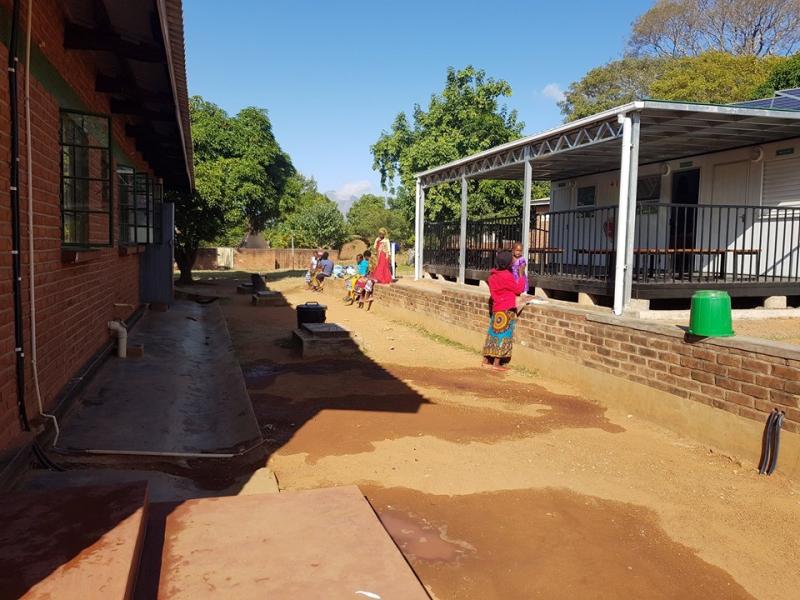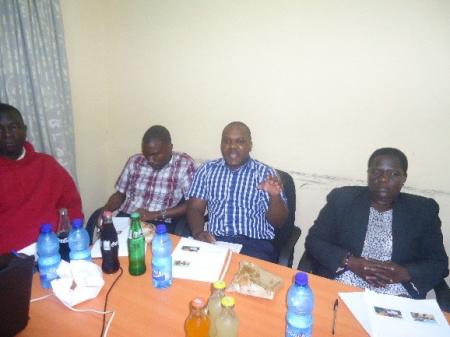White Ribbon Alliance aims for a 30% WASH access improvement at healthcare facilities in Chitipa, Zomba and Dowa, Malawi.
Published on: 11/11/2019
This blog is written by Enock Mnyenyembe, Communications Officer, White Ribbon Alliance Malawi
In 2002, White Ribbon Alliance (WRA) Malawi was set up to focus on reducing the maternal mortality rate of 439 deaths per 100,000 women. They work to increase the numbers of midwives in the country and raise the public profile of midwives through the press. They teach midwives to advocate for themselves by encouraging the government to budget for midwife services and within communities to raise their working conditions.
Now WRA Malawi brings this nearly two decades of advocacy experience to the healthcare arena and this time lobbies with the government at all levels to address the lack of water, sanitation and hygiene services in healthcare facilities (WASH in HCF). WRA Malawi is partnering with IRC and Global Water 2020 to implement a one year WASH in Healthcare Facilities project which aims for a 30% WASH access improvement at HCFs in Chitipa, Zomba and Dowa.

Machinjiri health centre, Zomba, Malawi
Since no information existed about the levels of WASH access in the districts, WRA Malawi surveyed 11 health facilities to establish a baseline of information. The assessment found the medical buildings lacked clean pit latrines, bathrooms, incinerators and placenta pits. They had non-functional taps, blocked plumbing systems, toilets and showers, unrepaired water tanks and water pumps. The survey also found poor grounds management and confounding efforts to stop cross-contamination of infectious diseases between patients.
WRA Malawi presented the WASH in HCF assessment findings to the Health Centre Management Committees of the sampled facilities and provided feedback to the District Health Management Teams (DHMT) in the target districts.
During the Zomba DHMT Assessment findings feedback meeting, former WRA Malawi National Coordinator Nancy Kamwendo presented the findings to the DHMT and asked if they are aware of such gaps and what steps they will take after receiving the WASH assessment reports. Representative of Zomba District Health Officer (DHO) Edward Wongani said the assessment findings are a true reflection of the WASH situation in most health facilities in the district. The team from the DHO conducts supervision and mentorship sessions where they work with health centre management teams to sort out WASH gaps in their respective health facilities. The DHO is committed to addressing the gaps in the assessment findings, however, they lack adequate funding from the city assembly hindering implementation of the DHO's projects, including WASH in HCFs.

Representative of Zomba, District Health Officer (DHO) Edward Wongani stressing a point that his office is underfunded by city assembly which affects their operations
Wongani said that after receiving the WASH assessment report, the DHO office engaged other stakeholders to address the WASH challenges in health facilities throughout the district. WRA Malawi and the Zomba District Health office worked together and today patients visiting the Machinjiri HCF have access to a functional water tap and rubbish bins.
The Machinjiri health facility officer in charge noted that a “few months ago patients here had broken taps, no running water, unattended grounds and blocked toilets. Through months of advocacy to the Ministry of Health and the Water Users Association of Malawi, access has been restored and we now have an improved WASH facility. We will continue to work hard with fellow staff and community to ensure that this is maintained and sustained.”
Following the release of WRA Malawi’s report of the WASH in HCF assessment, the Organized Network of Services for Everyone (ONSE), Malawi’s flagship programme that works to reduce maternal and newborn mortality, has committed to help Zomba’s DHO address some of the WASH challenges in health facilities in Makwapala, Machinjiri and Likangala.

At IRC we have strong opinions and we value honest and frank discussion, so you won't be surprised to hear that not all the opinions on this site represent our official policy.